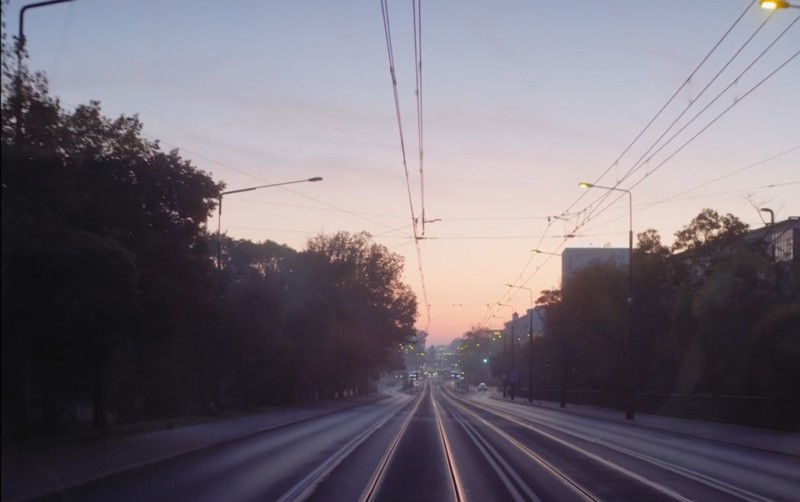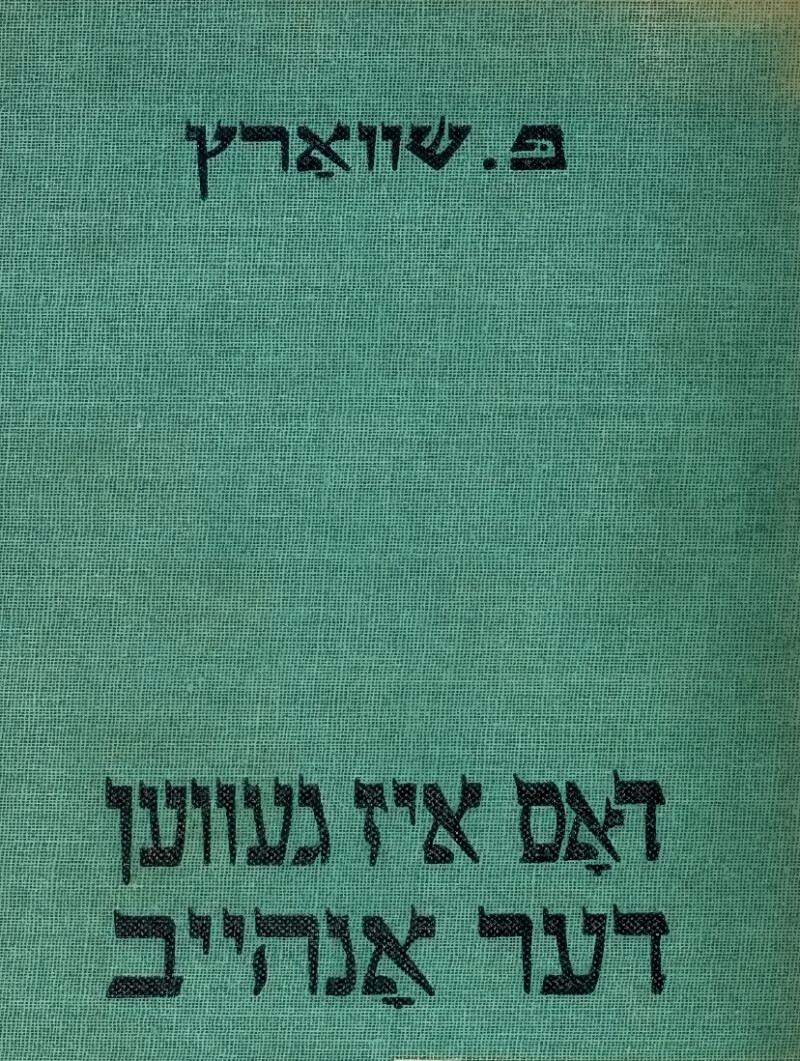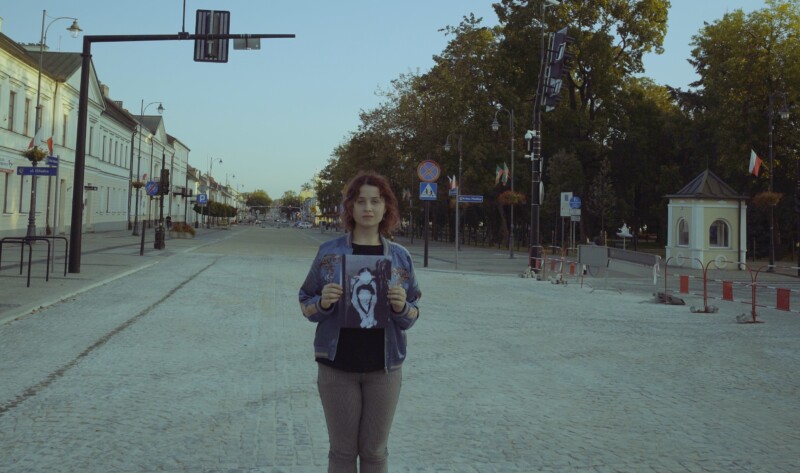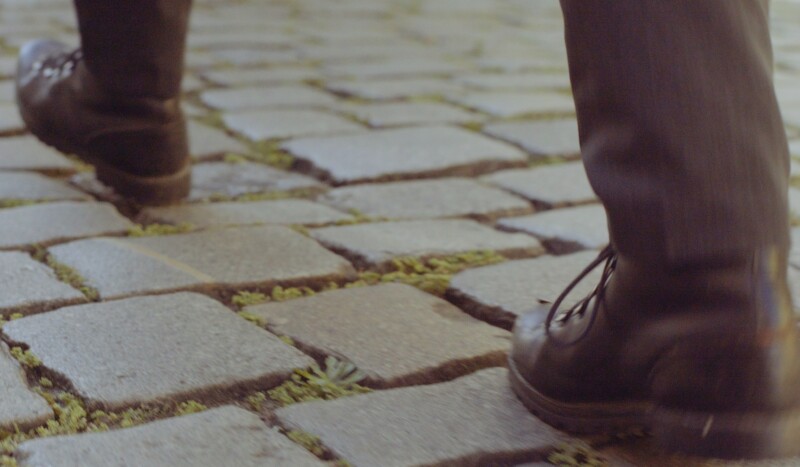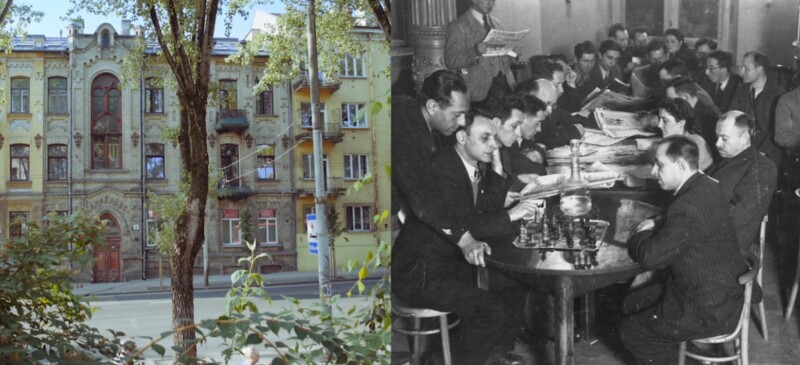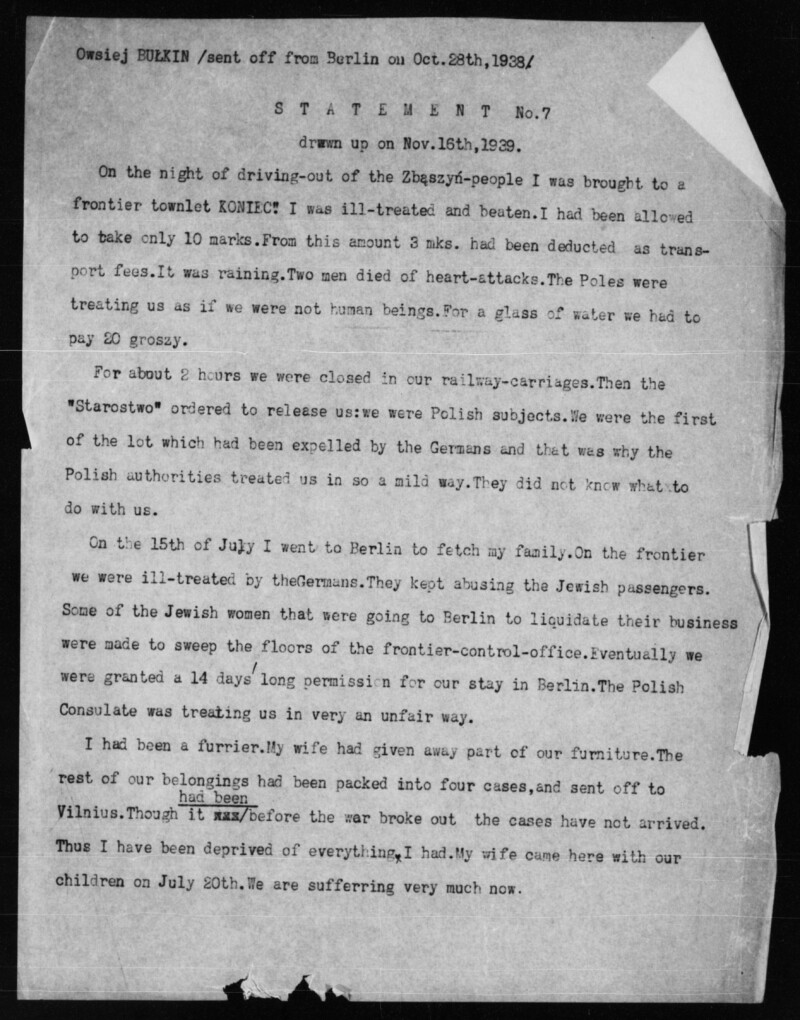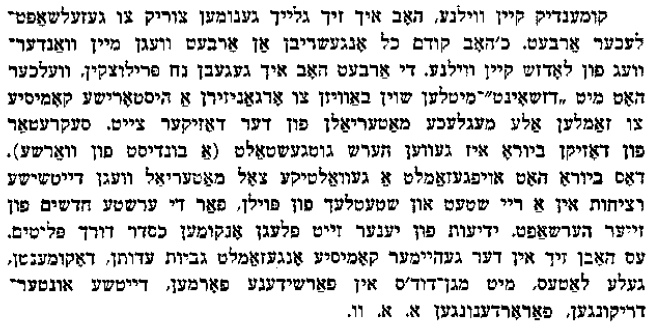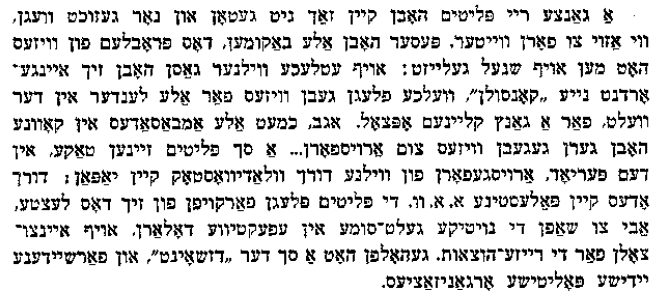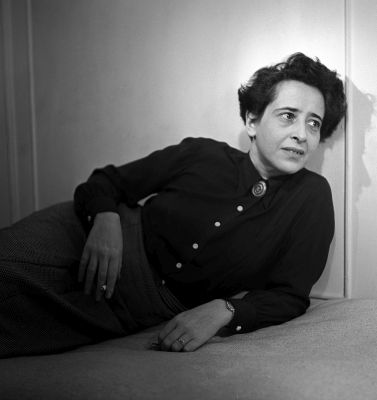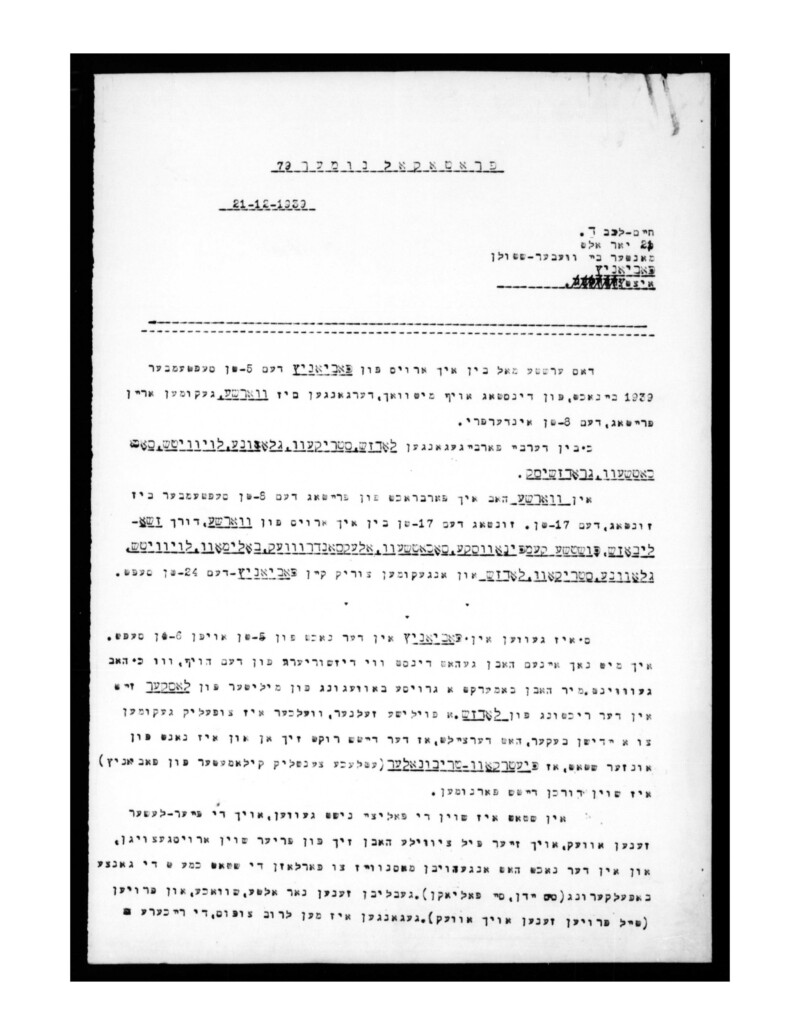[…] אַרום עלף פֿרי האָט דער צוג זיך אָפּגעשטעלט בײַ אַ קלײן הײַזל פֿון אַ באַן־װעכטער. פֿונדערװײַטנס האָט מען געזען 2־3 פֿאַבריק־קוימענס און עפּעס אַ גרויסע באַן־סטאַציע.
– דאָס איז לוקאָװ! – האָט אונדז אויפֿגעקלערט דער באַן־װעכטער – איך האָב אַ באַפֿעל צו פֿאַרהאַלטן די באַנען, װײַל די לוקאָװער באַן־סטאַציע איז אָקאָרשט געװאָרן באָמבאַרדירט.
[…] דערװײַל אָבער האָבן זיך אונטערגערוקט אַנדערע, דירעקטערע זאָרגן: איבער אונזער באַן האָבן זיך באַװיזן עראָפּלאַנען!
[…] אין צוג איז אַנשטאַנען אַ מוראדיקע סומאַטאָכע. עס האָט זיך איבערגעחזרט דאָס זעלבע, װאָס עס איז געשען אין ענלעכע אומשטענדן אויפֿן דאַנציקער באַנהויף אין װאַרשע ערבֿ אונדזער אַרויספֿאָר: אײניקע זײַנען אַרויסגעשפּרונגען פֿון באַן און אַנטלאָפֿן אין װאַלד אַרײַן, אַנדערע זײַנען אַרויסגעשפּרונגען פֿון באַן און געבליבן ליגן אין די גראָזן נעבן די רעלסן און נאָך אַנדערע זײַנען געבליבן אין באַן.
[…] דער עראָפּלאַן האָט דערװײַל געמאַכט אַן אויסשפּיר־קרײַז איבער אונדזער באַן און איבער דער פּאָמערנער באַן הינטער אונדז. דאַן איז ער אַװעקגעפֿלויגן צוריק אין דער ריכטונג פֿון דער באַן־סטאַציע.
אָבער עס האָט נישט געדויערט קײן פֿינף מינוט – דער עולם האָט קוים באַװיזן זיך צוזאַמענצולויפֿן צום צוג – װי דער זעלבער עראָפּלאַן האָט זיך באַװיזן צום צװײטן מאָל אין באַגלײטונג פֿון נאָך צװײ עראָפּלאַנען.
[…] אויך די דרײַ עראָפּלאַנען האָבן געמאַכט אַן אומקרײַז איבער אונדזער צוג און אַװעקגעפֿלויגן, נישט װאַרפֿנדיק קײן באָמבע. מיר זײַנען געזעסן אין װאַלד און אין די גריבער, װאַרטנדיק מיט האַרצקלאַפּעניש אויפֿן ערשטן אויפֿרײַס. עס זײַנען אָבער אַריבער בלויז עטלעכע מינוטן […] און מען האָט גענומען צו אונדז שרײַען פֿון דרויסן, אַז מיר קענען אַרויסגײן, װײַל די סכּנה איז אַריבער.
אָבער אַרײַנפֿאָרן קײן לוקאָװ האָבן די באַן־מאַשיניסטן זיך אָפּגעזאָגט:
–– […] עס װעט בעסער זײַן, אַז איר װעט אַרײַנגײן אין שטאָט אַרײַן צופֿוס, און מיר װעלן אין עטלעכע שעה אַרום זיך טרעפֿן אויפֿן באַנהויף, כּדי װײַטער צו פֿאָרן.
[…] דער טײַװל האָט געװאָלט, אַז גראָד אין דעם מאָמענט, װען מיר האָבן זיך שוין אינגאַנצן געהאַט דערנענטערט צו דער שטאָט, האָט זיך אָנגעהויבן אַ נײַע באָמבאַרדירונג. […]
[…] עס איז געװען געפֿערלעך צו בלײַבן אין שכנות פֿון װאָקזאַל. מיר האָבן גענומען לויפֿן צו די הײַזער פֿון דער נאָענטסטער גאַס. […] ענדלעך האָט אונדז אָפּגעגליקט צו טרעפֿן אַ לעבעדיקן מענטשן – עפּעס אַ קריסטלעך מײדל איז געשטאַנען פֿאַר אַ פֿאַרהאַמערט קרעמל און געקוקט אויף אונדז מיט נײַגיר. […] זי האָט געעפֿנט די טיר פֿונעם קרעמל. אינעװײניק איז געװען אַ געװעלבל מיט שפּײַז אד”גל. אין געװעלבל האָט זיך אַרײַנגעשטופּט אַ מאַן 10 פֿון אונדזער צוג – קריסטן און אידן. […] עס האָט זיך אַרויסגעװיזן, אַז מיר קענען דאָ קריגן װאָס מיר װילן: ברויט, פּוטער, אײער, װאורשט.
[…] עס איז געװען אַ פּרעכטיקער טאָג. די עראָפּלאַנען זײַנען געהאַט ערגעץ־װאו פֿאַרשװאונדן. […] שפּעטער האָבן מיר געלעגן מיטן פּנים צום הימל און געגלאָצט צום הימל־בלוי, װעלנדיק פֿאַרגעסן דאָס, װאָס עס איז פֿאָרגעקומען ביז איצט, און װאָס עס קען נאָך געשען אין אַ שעה אַרום: די װעלט איז אַזוי שײן, אַזוי שײן!
[…] עס איז געװען אַ מאָמענט, װען איך האָב געטראַכט: און אפֿשר זיך טאַקע נישט אויפֿהויבן? און אפֿשר טאַקע װײַטער נישט פֿאָרן?
אָבער איך האָב זיך אויפֿגעהויבן און װײַטער געפֿאָרן. אלע האָבן זיך אויפֿגעהויבן, כּדי װײַטער צו פֿאָרן.
[…] עס איז געװען אַרום 3 בײַטאָג, װען מיר זײַנען צוריקגעקומען צום חרובֿן לוקאָװער װאָקזאַל און גענומען זוכן אונדזערע װאַגאָנעס. […] בײַ דער באַן האָבן מיר זיך דערװאוסט, אַז “מיר האָבן געהאַט מזל”. דער צוג מיט פּליטים, װאָס איז געפֿאָרן הינטער אונדזער צוג, איז געטראָפֿן געװאָרן פֿון אַ באָמבע, און עס זײַנען געװען קרבנות.
At about 11 o’clock the train stopped at a small house of a train conductor. In the distance one could see 2-3 factory chimneys and a large station.
– That’s Łuków! – the conductor explained to us – I have orders to stop the trains because the Łuków station has recently been bombed.
[…] In the meantime, however, we had other more pressing concerns: airplanes appeared above our train!
There was a fearful commotion on the train. It repeated what had happened under similar circumstances in Gdańsk station in Warsaw at the beginning of our journey: some jumped off the train and ran into the woods, others jumped off the train and lay in the grass next to the tracks, and still others stayed on the train. […]
Meanwhile the plane made a reconnaissance flight over our train and over the train from Pomerania behind us. Then it flew away in the direction of the station.
But it did not last five minutes – the crowd had just gathered to the train – when the same plane appeared for the second time, accompanied by two others.
[…] These three planes were also circling above our train and flew away without dropping any bombs. We sat in the woods and in the pits and waited for the first detonation with palpitations. But only a few minutes passed […] when they started shouting at us that we could get out because the danger was over.
But the train drivers refused to enter Łuków:
[…] It will be better if you walk to town and we meet at the station in a few hours to continue.
[…] The devil wanted a new bombing to start at the very moment we arrived in the city.
It was dangerous to stay near the station. We started running to the houses in the next street. […] Finally we were lucky enough to meet a living person – some Christian girl was standing in front of a barricaded shop looking at us curiously. […] She opened the door of the shop. Inside was a shop with food etc. In the shop about 10 men from our platoon crowded in – Christians and Jews. […] It turned out that we could get what we wanted here: bread, butter, eggs, sausage.
It was a splendid day. The planes disappeared somewhere. […] Later we were lying facing the sky and looking up at the blue sky and wanted to forget everything that had happened so far and everything else that might happen within the next hour: The world is so beautiful, so beautiful!
[…] It was one of those moments when I thought: maybe I just won’t get up? Maybe I just won’t drive on?
Of course I got up anyway and drove on. Everybody got up and drove on.
[…] It was about 3 p.m. when we returned to the destroyed station in Łuków and looked for our wagons. On the train we learned that “we were lucky.” The train with refugees, which drove behind our train, was hit by a bomb and there were deaths.
Pinkhas Shvarts was a member of the Bund, writer and correspondent of the Yiddish Folks-tsaytung (People’s newspaper) in Warsaw and brother of the famous chronicler of the Holocaust in Lithuania, Herman Kruk. He was one of the few Polish-Jewish writers who managed to get a seat on the so-called journalist train, which left Warsaw for Lublin on the night of September 5-6, 1939, to escape the German invasion. One stopover was Łuków. He tells of the constant danger of German bombing.
The journalists reached Vilnius on October 10, 1939 after a long, dangerous and erratic journey. Arriving here, the Jewish refugees did not hesitate for long. In November 1939, a group of refugee fellow writers and journalists founded the Committee for the Collection of Material on the Destruction of Jewish Communities in Poland in 1939, probably the earliest Jewish historical commission in Eastern Europe, which, in the shadow of German crimes, secretly began to document the destruction of Polish Jewry since September 1939. Pinkhas Shvarts survived the Shoah by escaping via Vilnius in the direction of New York, and in 1957 became a leading member of the Bund‘s World Coodinating Committee.
Excerpt:
Pinkhas Shvarts, 1943: Dos iz geven der onheyb, New York: Farlag “Arbeter-ring”, Chapter 3: In bombardirtn Lukov.
From the Yiddish Book Center’s Steven Spielberg Digital Yiddish Library.
